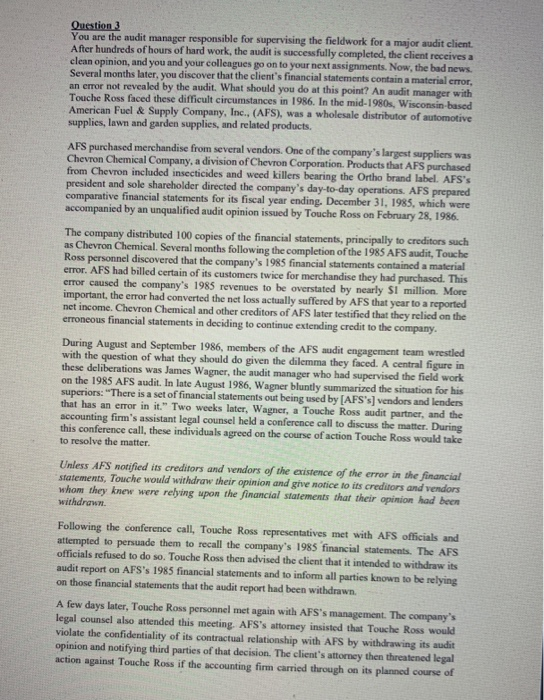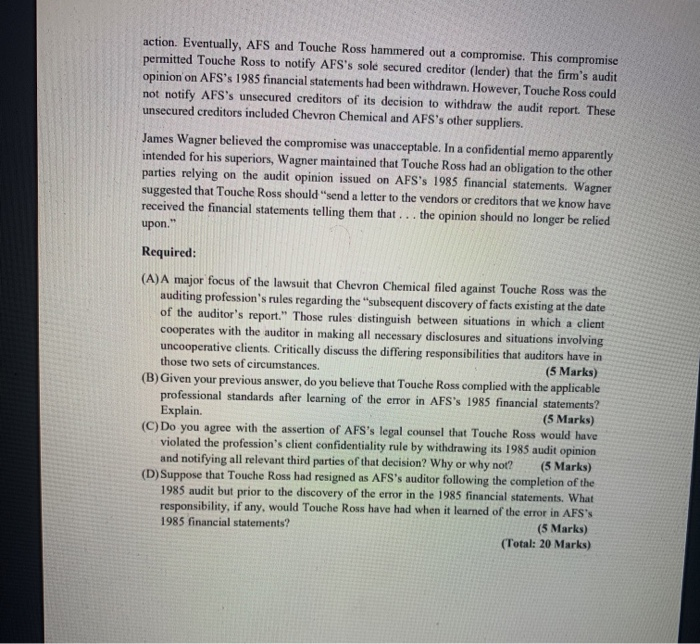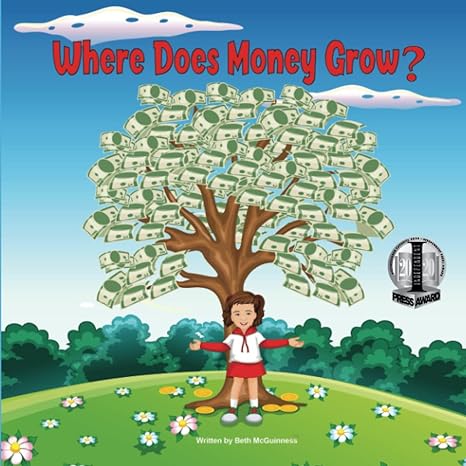auditing

Question 3 You are the audit manager responsible for supervising the fieldwork for a major audit client. After hundreds of hours of hard work, the audit is successfully completed, the client receives a clean opinion, and you and your colleagues go on to your next assignments. Now, the bad news. Several months later, you discover that the client's financial statements contain a material error, an error not revealed by the audit. What should you do at this point? An audit manager with Touche Ross faced these difficult circumstances in 1986. In the mid-1980s, Wisconsin-based American Fuel & Supply Company, Inc., (AFS), was a wholesale distributor of automotive supplies, lawn and garden supplies, and related products. AFS purchased merchandise from several vendors. One of the company's largest suppliers was Chevron Chemical Company, a division of Chevron Corporation. Products that AFS purchased from Chevron included insecticides and weed killers bearing the Ortho brand label. AFS's president and sole shareholder directed the company's day-to-day operations. AFS prepared comparative financial statements for its fiscal year ending. December 31, 1985, which were accompanied by an unqualified audit opinion issued by Touche Ross on February 28, 1986. The company distributed 100 copies of the financial statements, principally to creditors such as Chevron Chemical. Several months following the completion of the 1985 AFS audit, Touche Ross personnel discovered that the company's 1985 financial statements contained a material error. AFS had billed certain of its customers twice for merchandise they had purchased. This error caused the company's 1985 revenues to be overstated by nearly sl million. More important, the error had converted the net loss actually suffered by AFS that year to a reported net income. Chevron Chemical and other creditors of AFS later testified that they relied on the erroneous financial statements in deciding to continue extending credit to the company. During August and September 1986, members of the AFS audit engagement team wrestled with the question of what they should do given the dilemma they faced. A central figure in these deliberations was James Wagner, the audit manager who had supervised the field work on the 1985 AFS audit. In late August 1986, Wagner bluntly summarized the situation for his superiors: "There is a set of financial statements out being used by [AFS's] vendors and lenders that has an error in it." Two weeks later, Wagner, a Touche Ross audit partner, and the accounting firm's assistant legal counsel held a conference call to discuss the matter. During this conference call, these individuals agreed on the course of action Touche Ross would take to resolve the matter. Unless AFS notified its creditors and vendors of the existence of the error in the financial statements, Touche would withdraw their opinion and give notice to its creditors and vendors whom they knew were relying upon the financial statements that their opinion had been withdrawn. Following the conference call, Touche Ross representatives met with AFS officials and attempted to persuade them to recall the company's 1985 financial statements. The AFS officials refused to do so. Touche Ross then advised the client that it intended to withdraw its audit report on AFS's 1985 financial statements and to inform all parties known to be relying on those financial statements that the audit report had been withdrawn. A few days later, Touche Ross personnel met again with AFS's management. The company's legal counsel also attended this meeting. AFS's attorney insisted that Touche Ross would violate the confidentiality of its contractual relationship with AFS by withdrawing its audit opinion and notifying third parties of that decision. The client's attorney then threatened legal action against Touche Ross if the accounting firm carried through on its planned course of action. Eventually, AFS and Touche Ross hammered out a compromise. This compromise permitted Touche Ross to notify AFS's sole secured creditor (lender) that the firm's audit opinion on AFS's 1985 financial statements had been withdrawn. However, Touche Ross could not notify AFS's unsecured creditors of its decision to withdraw the audit report. These unsecured creditors included Chevron Chemical and AFS's other suppliers. James Wagner believed the compromise was unacceptable. In a confidential memo apparently intended for his superiors, Wagner maintained that Touche Ross had an obligation to the other parties relying on the audit opinion issued on AFS's 1985 financial statements. Wagner suggested that Touche Ross should send a letter to the vendors or creditors that we know have received the financial statements telling them that ... the opinion should no longer be relied upon. Required: (A)A major focus of the lawsuit that Chevron Chemical filed against Touche Ross was the auditing profession's rules regarding the "subsequent discovery of facts existing at the date of the auditor's report." Those rules distinguish between situations in which a client cooperates with the auditor in making all necessary disclosures and situations involving uncooperative clients. Critically discuss the differing responsibilities that auditors have in those two sets of circumstances. (5 Marks) (B) Given your previous answer, do you believe that Touche Ross complied with the applicable professional standards after learning of the error in AFS's 1985 financial statements? Explain. (5 Marks) (C)Do you agree with the assertion of AFS's legal counsel that Touche Ross would have violated the profession's client confidentiality rule by withdrawing its 1985 audit opinion and notifying all relevant third parties of that decision? Why or why not? (5 Marks) (D) Suppose that Touche Ross had resigned as AFS's auditor following the completion of the 1985 audit but prior to the discovery of the error in the 1985 financial statements. What responsibility, if any, would Touche Ross have had when it learned of the error in AFS's 1985 financial statements? (5 Marks) (Total: 20 Marks)









